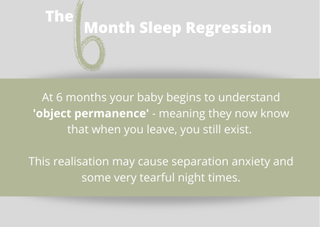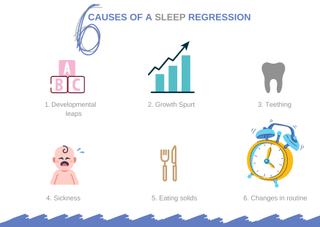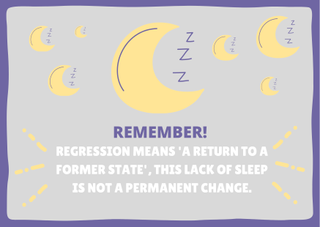Sleep regression ages - what are they and how long do they last?
Sleep regression is when a baby suddenly goes from sleeping regularly to struggling with sleep. Learn about causes, ages, and the best solutions

- Sleep regression ages
- 4-week sleep regression
- 4-month sleep regression
- 6-month sleep regression
- 8-month sleep regression
- 10-month sleep regression
- 2-year sleep regression
- How long does a sleep regression last?
- Why does sleep regression happen at different ages?
- Standing-up sleep regression
- Walking sleep regression
- Talking sleep regression
- What is sleep regression - the signs and what causes it?
- How to deal with a sleep regression
- 1. Recognise your baby's sleep cues
- 2. Give your baby full feeds during the day
- 3. Keep calm and take rest when you can
- 4. Keep to a bedtime routine
- 5. Avoid making sudden changes

Sleep regression ages don't fit into neat boxes - they can happen at 4 months, 10 months, and even at two years old. But while it may not feel like it, sleep regression is actually progression - your baby's sleep pattern is shifting as they reach new stages of development.
This could mean that your formerly OK-ish/good/perfect sleeper suddenly wakes up in the middle of the night or won't settle at nap time. You may have invested in the best baby monitor to track your baby's sleep patterns and done all the 'right' things to establish a pattern for getting your baby to sleep maybe a swaddling method, making sure to choose one of our tried and tested best swaddles. Then, out of nowhere, along comes a sleep regression. The good news? It's perfectly normal. And it's not forever.
The most common age for sleep regression in the first year is between eight and ten months. Author and experienced parenting coach Sarah Ockwell-Smith tells us: "Scientific research has found that the best sleep in the first year happens at around three to four months."
It’s exhausting just thinking about it, and that's before you even think about a newborn sleep schedule. But we're here to help parents left wondering when do babies sleep through the night with tips and expert guidance on how to deal with sleep regression.
Sleep regression ages
This feature covers the following aspects of sleep regression:
- Sleep regression ages
- Why does sleep regression happen at different ages?
- What is sleep regression - what are the signs and what causes it?
- How to deal with sleep regression
Sleep regression happens most often at a time of change or upheaval. While this can happen, due to outside influences, at any time in a baby's short life, it tends to happen at one of the following four sleep regression ages:
4-week sleep regression
After four weeks, babies have begun to adjust to life outside of the womb, new feeding patterns, and the difference between day and night. A slight sleep regression can therefore happen at four weeks. Babies usually sleep well in the first few days after birth, which lulls parents into a false sense of security," says Ockwell-Smith. "But the huge transition babies make from being inside the womb is a crazy difference and understandably impacts their sleep."
GoodtoKnow Newsletter
Parenting advice, hot topics, best buys and family finance tips delivered straight to your inbox.
"Babies are born needing a lot of sleep,'" explains sleep consultant Francesca Beauchamp. "They develop rapidly. It's all about feed, sleep, repeat! At two or three weeks babies also have a growth spurt. This can rouse them from sleep due to hunger, which is a normal phase in baby development." At four weeks you might feel like you're just getting the hang of it, so don't be disheartened if you feel like you then take two steps back with the four-week sleep regression.
How long will it last? Around 3-6 weeks
4-month sleep regression
The 4-month sleep regression is the most renowned. While the other sleep regressions are temporary, the 4-month one sees a permanent change in how your little one sleeps as they are now more aware of the world around them than ever before.
"The only sleep regression based on a real physiological change is this one, the four-month sleep regression," explains Heidi Skudder, The Parent & Baby Coach. "This regression occurs because the baby’s brain becomes more aware. They become more wakeful at the end of one sleep cycle and look for the same conditions that they had to fall asleep to move back into another sleep cycle. This can cause short naps and lots of nighttime waking too."
How long will it last? Around 3-6 weeks
6-month sleep regression
Most people don’t tend to experience a 6-month sleep regression with their baby. However, if you do it's likely to happen as early as 5 months and as late as 8 months. It can last anywhere between 2 to 6 weeks.
Why? Well, it's all down to baby development and milestones. It's at around 6 months old that teething kicks in. Maybe your little one is also flexing his core and trying to sit up? And some babies begin crawling around this age.

This is also the age your baby begins to understand 'object permanence' - meaning he now knows that when you leave him, you still exist. This realisation may cause separation anxiety and some very tearful night times.
How long will it last? Around 3-6 weeks
8-month sleep regression
One of the main issues is that there’s an enduring belief that by eight months babies should be sleeping through the night. In fact, teething can just start taking hold at this age and with newly introduced solid food, eight-month-old babies often have quite disturbed sleep patterns.
Then there’s the issue of separation anxiety. Babies don’t have any concept of time. Ockwell-Smith explains that every time you leave the room they may feel abandoned and scared that you’ll never return. An additional problem is that eight months can often coincide with the end of maternity leave, so your baby may have new routines or a new environment such as a nursery or childminder. 'Basically, if you have an eight, nine, or ten-month-old don't expect much sleep,' says Ockwell-Smith.
How long will it last? Around 3-6 weeks
10-month sleep regression
Sleep problems are common in the second half of a baby's first year. The changes are due to a baby's brain development. There is a lot that goes on cognitively at this age, and all of these changes can affect a baby's sleep - whether that means they start waking more at night and/or start resisting/refusing naps. In addition, some babies may cry out in the middle of the night, then calm down when you enter the room. This is separation anxiety - a normal stage of development that happens during this time.
How long will it last? Around 3-6 weeks
2-year sleep regression
While sleep regression is to be expected in 4 and 8-month-old babies, there are three specific stages that can cause toddler sleep regression. Mainly potty training, when they start nursery, or when a new sibling arrives. All of these disturb the status quo, which can leave your child feeling anxious and upset, disrupting their sleep routines.
Sleep consultant Francesca Beauchamp agrees: "Regressions in older children are often a result of big changes in little lives that can come on suddenly and out of nowhere. When this happens it’s really important to validate your child’s feelings. Offer lots of love, cuddles, and praise during waking hours and keep bedtime straightforward and calm."
How long will it last? Around 3-6 weeks
How long does a sleep regression last?
No matter the age, a sleep regression will usually last 3-6 weeks, so hold on! And, while it may be hard to do when you're hanging by an exhausted thread, focus on the fact that regression means a return to a former state. This lack of sleep is not permanent, it's a blip and your child will sleep again.
Consistency is key! We tried our best to stay on track with our sleep schedule even if that meant going back into soothe our baby 32 times in one evening. (We did, we counted!) - Mum of one, Carla C
You do what you need to do to get through these nights, but try not to return to old habits or create any new ones. Consistency is key or else you'll be in for a whole lot of different sleep challenges once the regression is over.
"If you can, be patient," says Sarah Ockwell-Smith. "Most sleep regressions will pass naturally without you doing anything." Every baby is different, so try to not hold onto expectations about how your baby 'should' be behaving. Just as babies go through phases to learn to crawl, talk or eat, learning to sleep is another process with lots of ups and downs.
Why does sleep regression happen at different ages?
Because each age comes with a developmental change in your baby. These changes can be learning to crawl or sit up and they can interfere with sleep.
It usually lasts three to six weeks. These developmental processes can create 'sleep-wake' rhythms and inconsistent sleep patterns for your baby (and you!) according to sleep research.
Even if you’ve invested in the best Moses basket or best cotbed, it's likely your little one will reach a point, the main one being around 4 months, where they struggle to sleep due to a period of development, a growth spurt, or changes in routine.
Sleep consultant Sarah Patelagrees: "Sleep is always moving forward. Not in a straight line, granted, but it is a progression. Parents should prepare, around the 4-6 month mark, for the fact that this disruption to their baby's sleep, if they notice it - some parents don't - is totally normal."
"While I know this time is really difficult it's not something that needs 'fixing'. Sleep progression is more about riding it out. Parent and baby getting through it together."
Newborn sleep, (first 3 months) and infant sleep (3 months +) are very different. Studies show in the first two months of life your baby needs between 14 and 17 hours of sleep per day, but that sleep comes in 1-3 hour segments throughout the day. Newborns often baffle people when they fall asleep almost instantly and stay sleeping through the loudest of things - a motorbike, dogs barking, or over-zealous siblings playing Paw Patrol near their head.

A recent study found that at birth infants lack an established circadian rhythm and as such can sleep across multiple intervals across the day. They immediately go into the deepest stage of sleep, hence the term; 'newborn bubble'. They sleep like dozy little angels.
In contrast, a 6-month-old starts out in a lighter sleep and makes their way through the three stages of NREM (non-rapid eye movement) sleep where the third stage is the deepest sleep. So as your baby is growing out of the newborn phase, they start to experience the lighter stages of sleep before getting into that deep sleep, and this is where they need help and support.
Sarah Ockwell-Smith, a parenting expert, trained psychologist, and author of The Gentle Sleep Book, told us: "New parents assume that their baby’s sleep starts off really bad then gets progressively better until at some point it becomes 'good' like that of an adult. The trouble is, life doesn't work like that."
Ockwell-Smith likens sleep to a roller coaster with peaks when you feel rested and then lots of big dips, just when you think you have the whole sleep thing sorted.
"What’s important to remember is that adults don't always sleep particularly well," adds Sarah Ockwell-Smith. "We often wake at night and our sleep gets disturbed by different things. So why would babies be any different?"
Different types of sleep regression
There are many types of sleep regression, and they're usually all linked to progression and new skills. The top three main skills that new babies are trying to master are standing up, walking, and talking.
1. Standing-up sleep regression
At around nine months your baby becomes stronger and more coordinated - enough to begin pulling himself into a standing position. So rather than chill out for naps or sleep in his cot, your baby may start to practise his wobbly stance.
This is a skill he needs to practise, so give him lots of chances during his ‘awake time’ to work on it. Either in the cot or with the help of other stable furniture such as the sofa. Also, remember to teach your baby how to sit back down. Show him how it feels - attach his hands to the cot railings and bend his knees. Babies can sometimes get stuck in their new standing position.
I remember when my son was around 9 months old, I was hearing bangs over the monitor. When I checked it was him crawling into the end of his cot while asleep - practising his moves! - Mum-of-two, Jasmine C
2. Walking sleep regression
Babies tend to start walking around 12 months, which can often lead to difficulties in going to sleep and issues with your youngster waking up restless in the middle of the night. This is the time you need to start letting them move and burn off their excess energy, which will help with more settled sleep too.
I noticed that, as he grew, my son's mainstays were his muslin 'Muzzy' and chatting. He would just babble away to himself while playing with the corner of his muzzy as a way of self-soothing. It was a hard slog but we got there eventually. - Mum-of-one, Steph J
3. Talking sleep regression
Of the three types of sleep regression, this is the easiest one. Instead of hearing bangs or worrying about your little one falling over in his cot, this is more chatting and making noises in general. The early hours are a common time for babies to wake up and practise their talking or singing.

What is sleep regression - the signs and what causes it?
Sleep regression is actually progression - it's a shift in your baby's sleep patterns. It's only temporary and you will come out the other side. Re-framing this as 'progress' can help you to deal with it.
Sleep regression ages vary throughout the first two years of your baby's life. Think of baby sleep as a wiggly line of a concept, full of progression and child development stages, ups, downs, and roundabouts. It’s not something that simply improves over time, and sleep regression ages are typically different for each baby.
It's a good sign that their sleep is disrupted as it means your child is developing. While you can't stop sleep regression entirely, you can help your baby through it.
Signs of a sleep regression
If your little one has generally been settling and sleeping well until now, the signs that your baby is experiencing a sleep regression are:
- Resisting bedtime
- Restlessness and more frequent night waking
- Struggling to get back to sleep after night time waking
- Sleeping for longer in the day
Sleep regression may be caused by any of the following:
- Developmental leaps, such as sitting up or rolling over
- Growth spurts
- Pain, such as teething
- Sickness, such as a cold or cough
- Changes in routine, including going on holiday, moving home, or the primary carer returning to work
- Eating solids for the first time
How to deal with a sleep regression
Surviving sleep regression is all about being patient and kind to yourself and your baby. It's a tough time for all involved, so don't be too hard on yourself and trust your instincts.
Sarah Patel, renowned sleep consultant speaking at The Baby Show, agrees and urges parents to think of sleep progression from your baby’s perspective. "Step back and calmly assess things," she advises.
"Your baby has no clue what's happening either. Your baby's sleep needs have changed, so consider what you do to support them. Feed them to sleep or lay with them? You know your baby better than anyone else, so do what works for you both. In the meantime, take deep breaths and focus on the fact that this isn't forever."
With my youngest it was like clockwork - learning to roll, crawl or walk - all these milestones came with a sleep regression, then back to normal, just hold on in there. - Mum of three, Laura S
And, on the days when things really have gone to pot, get outside. Lots of daylight helps with circadian rhythm. And remember that while consistency is good, sometimes forgetting the schedule and just rolling with it is better. So, whether in the pram, sling, or car, when it comes to getting through a sleep progression all naps count.
Plus, try some of these simple techniques for dealing with a sleep regression:
1. Recognise your baby's sleep cues
The window of 'tired' is a small one - after that they're overtired and settling them to sleep becomes even harder. Get to know your baby's sleep cues;
- Rubbing eyes
- Fussiness
- Staring into space
- Looking away from anything stimulating
If you spot any of these tiredness signs, get them to bed before they're overtired. Catch them yawning and you may already be too late. When you spot the cues, act fast and get them down to sleep.
2. Give your baby full feeds during the day
Ensure your baby takes full feeds throughout the day, especially before bed and the all-important dream feed. If your baby is distracted or not feeding well, try a quieter room away from distractions. Allow yourself plenty of time and avoid multitasking whilst feeding to ensure your baby is calm and feeds well. Read our guide to the best nursing pillows to make bottle or breastfeeding more comfortable.
3. Keep calm and take rest when you can
Your rest is as important as the baby's. Ask for help: if a partner or trusted friend can watch the baby whilst you catch up on sleep during the day you will feel more able to deal with disruption at night. Go to sleep as early as you can after the baby is in bed, so you have undisturbed sleep before they wake. Also try to avoid making many social or work plans during this time, as you will need to conserve your energy to deal with a sleep regression.
4. Keep to a bedtime routine
If you aren't already, put your baby to bed at the same time each night. A four-month-old baby should be settled in their cot by 7 pm at the latest. A good bedtime routine might include singing the same gentle songs, closing the curtains, dimming the lights, giving the baby a gentle bath or massage, putting them in their pajamas, and giving them the evening feed at about 6.30 pm. You can use one of these 12 best sleep aids to create relaxing background white noise or music. Start the bedtime routine at about 6 pm or when they give you tired cues like grizzling or rubbing your eyes. Try some of these ideas for a successful bedtime routine in our baby sleep guide.
5. Avoid making sudden changes
Don't feel like you have to suddenly change everything you've been doing when sleep regression starts, as this will only create more unsettled feelings for you and the baby. In fact, sleep regression often happens because of physical, developmental, or environmental changes in the first place. If you'd like to start a nap or bedtime routine, start gradually so you both become more accustomed.
- This article was verified by Katie Palmer, a certified sleep practitioner under Solent NHS Trust. She is both NNEB and MNT trained and is a qualified professional working on expert site, Infant Sleep Consultants.
Related features:

Stephanie Lowe is Family Editor at GoodToKnow covering all things parenting, pregnancy and more. She has over 13 years' experience as a digital journalist with a wealth of knowledge and experience when it comes to all things family and lifestyle. Stephanie lives in Kent with her husband and son, Ted. Just keeping on top of school emails/fund raisers/non-uniform days/packed lunches is her second full time job.
-
 New research has linked video games to teen psychosis - here's what parents need to know
New research has linked video games to teen psychosis - here's what parents need to knowTeenagers who spend a lot of time playing video games are more likely to have a psychotic experience, according to a new study.
By Ellie Hutchings Published
-
 You might want to hold your tongue when watching your kids play sports - new study reveals the massive impact a parent’s sideline behaviour can have on children
You might want to hold your tongue when watching your kids play sports - new study reveals the massive impact a parent’s sideline behaviour can have on childrenWhen you're shouting from the sidelines, the words you say can hugely affect your child's approach to sport
By Charlie Elizabeth Culverhouse Published